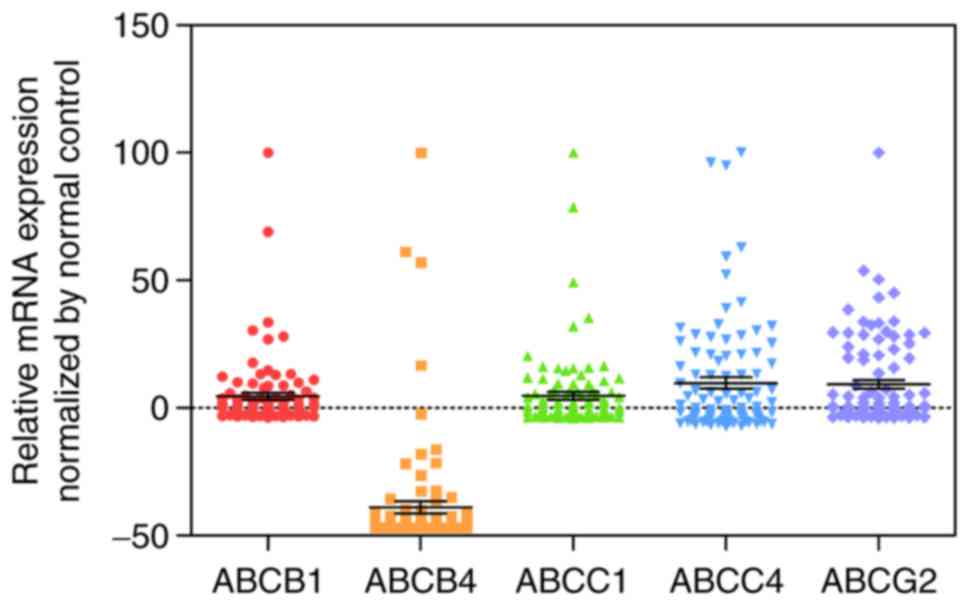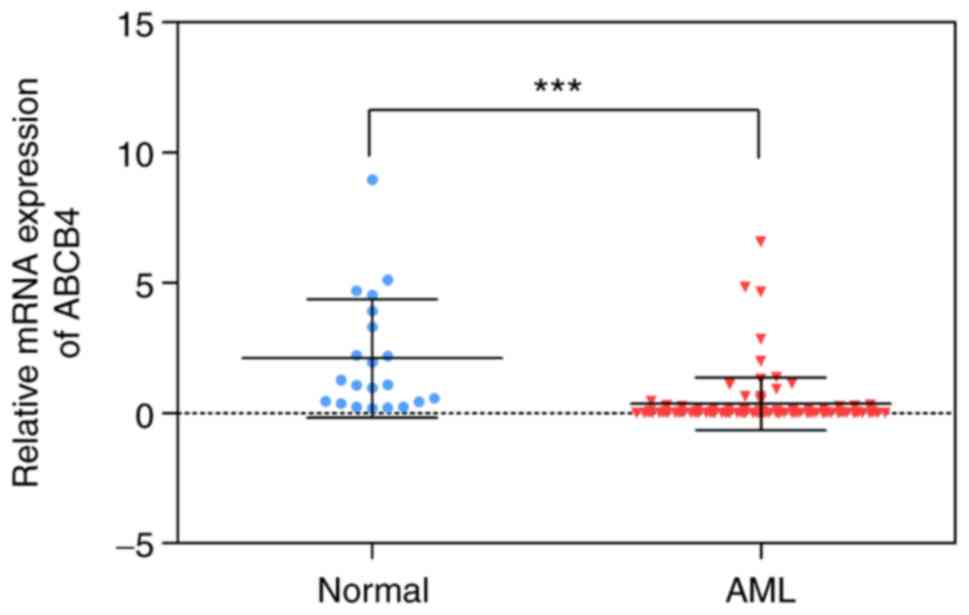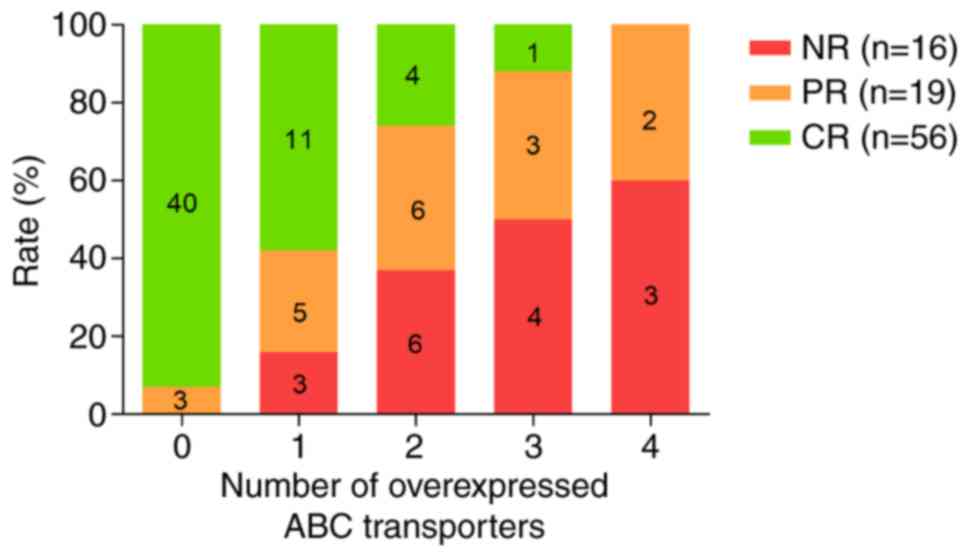|
1
|
Zöchbauer S, Gsur A, Brunner R, Kyrle PA,
Lechner K and Pirker R: P-glycoprotein expression as unfavorable
prognostic factor in acute myeloid leukemia. Leukemia. 8:974–977.
1994.PubMed/NCBI
|
|
2
|
Marzac C, Garrido E, Tang R, Fava F,
Hirsch P, De Benedictis C, Corre E, Lapusan S, Lallemand JY, Marie
JP, et al: ATP binding cassette transporters associated with
chemoresistance: Transcriptional profiling in extreme cohorts and
their prognostic impact in a cohort of 281 acute myeloid leukemia
patients. Haematologica. 96:1293–1301. 2011. View Article : Google Scholar : PubMed/NCBI
|
|
3
|
Januchowski R, Wojtowicz K, Andrzejewska M
and Zabel M: Expression of MDR1 and MDR3 gene products in
paclitaxel-, doxorubicin- and vincristine-resistant cell lines.
Biomed Pharmacother. 68:111–117. 2014. View Article : Google Scholar : PubMed/NCBI
|
|
4
|
Matthews C, Catherwood MA, Larkin AM,
Clynes M, Morris TC and Alexander HD: MDR-1, but not MDR-3 gene
expression, is associated with unmutated IgVH genes and poor
prognosis chromosomal aberrations in chronic lymphocytic leukemia.
Leuk Lymphoma. 47:2308–2313. 2006. View Article : Google Scholar : PubMed/NCBI
|
|
5
|
Drain S, Catherwood MA and Alexander HD:
Multidrug resistance in the chronic lymphoproliferative disorders.
Leuk Lymphoma. 51:1793–1804. 2010. View Article : Google Scholar : PubMed/NCBI
|
|
6
|
Liu B, Zhao L, Ma HZ, Zhang W and Jin Y:
Knockdown of MRP4 by lentivirus-mediated siRNA improves sensitivity
to adriamycin in adriamycin-resistant acute myeloid leukemia cells.
Chin Sci Bull. 57:90–97. 2012. View Article : Google Scholar
|
|
7
|
Yuan X, Koehn J and Hogge DE:
Identification of prognostic subgroups among acute myeloid leukemia
patients with intermediate risk cytogenetics using a
flow-cytometry-based assessment of ABC-transporter function. Leuk
Res. 39:689–695. 2015. View Article : Google Scholar : PubMed/NCBI
|
|
8
|
Cordon-Cardo C, O'Brien JP, Casals D,
Rittman-Grauer L, Biedler JL, Melamed MR and Bertino JR:
Multidrug-resistance gene (P-glycoprotein) is expressed by
endothelial cells at blood-brain barrier sites. Proc Natl Acad Sci
USA. 86:pp. 695–698. 1989; View Article : Google Scholar : PubMed/NCBI
|
|
9
|
Chen Z, Shi T, Zhang L, Zhu P, Deng M,
Huang C, Hu T, Jiang L and Li J: Mammalian drug efflux transporters
of the ATP binding cassette (ABC) family in multidrug resistance: A
review of the past decade. Cancer Lett. 370:153–164. 2016.
View Article : Google Scholar : PubMed/NCBI
|
|
10
|
Cianfriglia M, Mallano A, Ascione A and
Dupuis ML: Multidrug transporter proteins and cellular factors
involved in free and mAb linked calicheamicin-gamma1 (gentuzumab
ozogamicin, GO) resistance and in the selection of GO resistant
variants of the HL60 AML cell line. Int J Oncol. 36:1513–1520.
2010. View Article : Google Scholar : PubMed/NCBI
|
|
11
|
Schinkel AH and Jonker JW: Mammalian drug
efflux transporters of the ATP binding cassette (ABC) family: An
overview. Adv Drug Deliv Rev. 55:3–29. 2003. View Article : Google Scholar : PubMed/NCBI
|
|
12
|
Farawela HM, Khorshied MM, Kassem NM,
Kassem HA and Zawam HM: The clinical relevance and prognostic
significance of adenosine triphosphate ATP-binding cassette (ABCB5)
and multidrug resistance (MDR1) genes expression in acute leukemia:
An egyptian study. J Cancer Res Clin Oncol. 140:1323–1330. 2014.
View Article : Google Scholar : PubMed/NCBI
|
|
13
|
Chauhan PS, Bhushan B, Singh LC, Mishra
AK, Saluja S, Mittal V, Gupta DK and Kapur S: Expression of genes
related to multiple drug resistance and apoptosis in acute
leukemia: Response to induction chemotherapy. Exp Mol Pathol.
92:44–49. 2012. View Article : Google Scholar : PubMed/NCBI
|
|
14
|
Kim HP, Bernard L, Berkowitz J, Nitta J
and Hogge DE: Flow cytometry-based assessment of mitoxantrone
efflux from leukemic blasts varies with response to induction
chemotherapy in acute myeloid leukemia. Cytometry B Clin Cytom.
82:283–294. 2012. View Article : Google Scholar : PubMed/NCBI
|
|
15
|
Varatharajan S, Abraham A, Karathedath S,
Ganesan S, Lakshmi KM, Arthur N, Srivastava VM, George B,
Srivastava A, Mathews V and Balasubramanian P: ATP-binding casette
transporter expression in acute myeloid leukemia: Association with
in vitro cytotoxicity and prognostic markers. Pharmacogenomics.
18:235–244. 2017. View Article : Google Scholar : PubMed/NCBI
|
|
16
|
Guo Y, Köck K, Ritter CA, Chen ZS, Grube
M, Jedlitschky G, Illmer T, Ayres M, Beck JF, Siegmund W, et al:
Expression of ABCC-type nucleotide exporters in blasts of adult
acute myeloid leukemia: Relation to long-term survival. Clin Cancer
Res. 15:1762–1769. 2009. View Article : Google Scholar : PubMed/NCBI
|
|
17
|
Hauswald S, Duque-Afonso J, Wagner MM,
Schertl FM, Lübbert M, Peschel C, Keller U and Licht T: Histone
deacetylase inhibitors induce a very broad, pleiotropic anticancer
drug resistance phenotype in acute myeloid leukemia cells by
modulation of multiple ABC transporter genes. Clin Cancer Res.
15:3705–3715. 2009. View Article : Google Scholar : PubMed/NCBI
|
|
18
|
Bartholomae S, Gruhn B, Debatin KM,
Zimmermann M, Creutzig U, Reinhardt D and Steinbach D: Coexpression
of multiple ABC-transporters is strongly associated with treatment
response in childhood acute myeloid leukemia. Pediatr Blood Cancer.
63:242–247. 2016. View Article : Google Scholar : PubMed/NCBI
|
|
19
|
Liu Y, Cui P, Chen J and Li W: Isolation
and phenotypic characterization of side population cells in oral
squamous cell carcinoma. Mol Med Rep. 11:3642–3646. 2015.
View Article : Google Scholar : PubMed/NCBI
|
|
20
|
Kiehl S, Herkt SC, Richter AM, Fuhrmann L,
El-Nikhely N, Seeger W, Savai R and Dammann RH: ABCB4 is frequently
epigenetically silenced in human cancers and inhibits tumor growth.
Sci Rep. 4:68992014. View Article : Google Scholar : PubMed/NCBI
|
|
21
|
Zinzi L, Contino M, Cantore M, Capparelli
E, Leopoldo M and Colabufo NA: ABC transporters in CSCs membranes
as a novel target for treating tumor relapse. Front Pharmacol.
5:1632014. View Article : Google Scholar : PubMed/NCBI
|
|
22
|
Kampen KR, Ter Elst A, Mahmud H, Scherpen
FJ, Diks SH, Peppelenbosch MP, de Haas V, Guryev V and de Bont ES:
Insights in dynamic kinome reprogramming as a consequence of MEK
inhibition in MLL-rearranged AML. Leukemia. 28:589–599. 2014.
View Article : Google Scholar : PubMed/NCBI
|
|
23
|
Chen Y, Bieber MM and Teng NN: Hedgehog
signaling regulates drug sensitivity by targeting ABC transporters
ABCB1 and ABCG2 in epithelial ovarian cancer. Mol Carcinog.
53:625–634. 2014.PubMed/NCBI
|
|
24
|
Lin CC, Hsu YC, Li YH, Kuo YY, Hou HA, Lan
KH, Chen TC, Tzeng YS, Kuo YY, Kao CJ, et al: Higher HOPX
expression is associated with distinct clinical and biological
features and predicts poor prognosis in de novo acute myeloid
leukemia. Haematologica. 102:1044–1053. 2017. View Article : Google Scholar : PubMed/NCBI
|
|
25
|
Alharbi RA, Pettengell R, Pandha HS and
Morgan R: The role of HOX genes in normal hematopoiesis and acute
leukemia. Leukemia. 27:1000–1008. 2013. View Article : Google Scholar : PubMed/NCBI
|

















